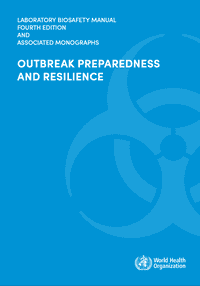LBM, 4th Edition: Outbreak Preparedness and Resilience Monograph
[LBM 4: Outbreak Preparedness and Resilience]
One of seven monographs associated with the 4th edition of the WHO LBM. This monograph covers outbreak preparedness and resilience, mainly focusing on the need for rapid and reliable laboratory diagnostics in an outbreak situation, for both local and global events.
SUMMARY
The Outbreak preparedness and resilience monograph covers outbreak preparedness and resilience, mainly focusing on the need for rapid and reliable laboratory diagnostics in an outbreak situation, for both local and global events. This monograph outlines operating procedures based on lessons learned from previous outbreaks, including the West African Ebola virus PHEIC from 2014-2016. This monograph is one of seven associated with the 4th edition of the WHO Laboratory Biosafety Manual (LBM), and draws on important lessons from the risk-and-evidence based approach in the LBM, the risk assessment monograph, the PPE monograph and the decontamination monograph and applies them to an outbreak situation, in addition to providing clear guidance for outbreak situations. The creation of this monograph was funded by Global Affairs Canada, the United States Department of State and the United States Defense Threat Reduction Agency.
The LBM guidelines have been globally recognized as a fundamental resource for laboratory biosafety since the first edition was released in 1983. While the standards outlined in this manual are not legally binding, they have become the defacto global standard for biosafety and have inspired many national codes. These guidelines are developed with experts from around the world, and were most recently updated for the fourth edition in 2020, which places a larger emphasis on an evidence and risk based approach to biosafety and biosecurity. Previous editions of the manual have been published in 13 languages, although, as of the last time this library was updated, the 4th edition was only available in English. The development of the manual is led by the Biosecurity and Health Security Interface at the WHO, a team who also supports national implementation efforts of the International Health Regulations and emergency preparedness.


..png)
